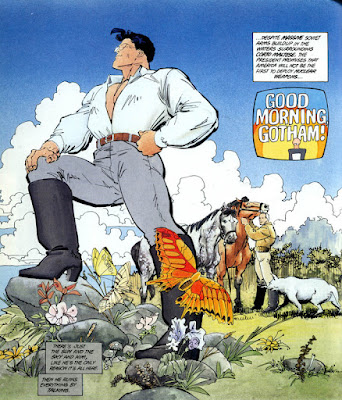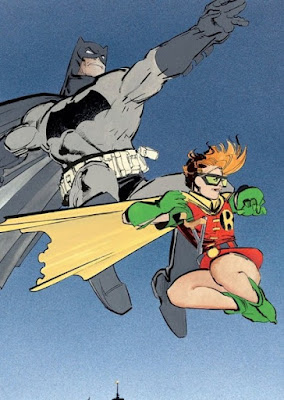Haven't been writing lately, which has allowed me more time for reading. But I find, often, that when I look back at the books I've read, though I may heartily recommend a title, I have trouble recollecting anything as to its contents. All that's left is the feeling that it was good or insightful or worthwhile, which isn't nothing, but it's less than I'd like. So, I'm trying something new -- both to possibly kickstart the writing habit . . . again, and maybe to afford my aging brain the opportunity to hold more of what I've read within its gray matter. Thus, the first in what I hope will be a series of posts relating what I've read and what I thought of it. I plan these to be more off the cuff than finely tuned pieces of writing, preferring to "work out on the page" what I thought of the book rather than making this into homework. The ideas offered may come across as half-formed or half-baked, and I apologize if this puts you off, but this is more for me than you--spontaneous, unformed, following whatever thread is sparked in my brain as I'm writing. If you gain something from this, that's great and thanks for reading, if you don't, I am sorry, but what'reyagonnado?
For this inaugural edition we have the latest nonfiction book I've read: AFTER THE IVORY TOWER FALLS, HOW COLLEGE BROKE THE AMERICAN DREAM AND BLEW UP OUR POLITICS--AND HOW TO FIX IT, by Will Bunch.
Prior to WWII, college in America was a haven for the well-off, the top 5% of our society being afforded the opportunity of postsecondary education, while the rest of the country found themselves relegated to the fields or factories to make ends meet. But, after America helped to defeat Nazism, there was a question of what to do for the returning veterans, and one idea was the G.I. Bill, allowing veterans the opportunity to attend college that hadn't been possible before (with the caveat that this meant white veterans, in the main). Many college presidents felt these working class men would soften the learning at their venerated institutions, but they were proven wrong.
The American Dream had found another pipeline, as college became a stepping stone for many working class whites to better their status in society, while also engaging their minds and working toward the civic good of all. It was a time when America came to understand education as a public good, something to be aspired to and lauded. In the decades that followed public universities flourished, women were also afforded the chance to seek higher education, and the government assisted, with Pell Grants being a primary tool for allowing those with lesser financial means to afford the cost. But this was a time when tuition was not as exorbitant, in relation to household incomes across the spectrum of fiscal wherewithal. It was a time of great opportunity and aspiration.
But during the upheaval of the 1960s and 70s things began to turn. Those on the conservative right of American politics (Republicans, say it, Republicans) turned away from the idea of education as a public good. In governors' mansion and state legislatures across the country they slashed funding for public colleges. This drop in funding, along with the privatization of universities, banks, and other financial institutions, meant there was a rise in tuitions for public universities. Pell Grants and other government programs meant to assist people with the cost of college did not keep up, and many times were also slashed or at least became stagnated under Republican fists.
The cost of college soared out of reach of many, and continues to do so, but these people also held true to the idea that a college diploma was the only way for later generations to improve their status within society. And this improvement is still true, to a point. During recent recessions, the unemployment rates of those without a diploma have often been double that of people who've earned a college degree. But what about the cost behind that degree? Those people are burdened, now, with debt spreading into the tens of thousands or even hundreds of thousands of dollars, even when they attend state universities, and it is a debt crisis that is untenable.
With the rising cost of college, the divide between the haves and have-nots has also increased, and this has spilled over into our political ideologies. Republicans, thanks in no small part to hateful rhetoric from talk-show personalities like Rush Limbaugh, believe that college is nothing more than an indoctrination society for politically correct ideas of equality, respect, and representation for minorities. Democrats see this thinking as ill-informed and downright wrong, and they see college as the grand answer to all of society's ills. They're both wrong (though conservatives are more wrong).
The real problem is, truly, the rising debt spiral for those attending college. It burdens those who choose to follow the traditional path to a better life, while it shuts out so many more who would benefit if given the opportunity, and, maybe even more dastardly, it labels those who do not attend college (a four-year institution, as I've been using the term 'college' throughout) as lacking in merit. Which is completely wrong. Education -- post-secondary education, including not just four-year universities but also trade schools, internships, community colleges, and other, similar programs -- must be seen as a common good, once more. We are failing our young people, at the point when they are most vulnerable: "You're 18 now, better figure out, fast, what you're gonna do with you entire life, and get right to it!" We need to do better.
Where do the politicians get it wrong?
As noted above, Republicans feel that colleges have become incubators for indoctrinating their children into 'politically correct' thinking. This is false.
Democrats focus only on four-year institutions, with their proposals of canceling student debt or making public colleges tuition-free, failing to consider the cohort for whom a four-year degree program is not the answer.
An idea put forth by Bunch, an idea that has been percolating for decades, is the idea of a mandatory year of service for 18-year-olds. Where the collective battle against Nazism brought us together as a country, maybe it would be a good idea to have something on that scale that could allow all of our young people to have a common touchstone. With the diminishing rolls of people at church or joining civic organizations, there is a need for something to connect us. This solitude that is enveloping our society is helping to foment the divisions we see in our politics. We don't talk to one another any more. We don't meet up at the Lions Club. We don't talk during the tea service after church. We don't bridge the divide that is tearing our country apart. A year of service, where one would be in a collective that consisted of people from across the political spectrum of America might be the first step in healing this wound. And it would give young people an opportunity to earn a living, learn some skills, and consider what they might want to do next, without having to dive into the deep end of the pool where loan sharks and bone-crushing debt awaited them.
And we need to also, as a country and through the federal government, make education beyond high school a priority once again. We need to fund it, to push it, to make it a reality for everyone. But, that does not mean just four-year universities. We need to broaden our idea of post-secondary education. Include internships, trade schools, and other institutions and programs, as noted earlier in this spiel, so that we provide opportunities that match up with everyone's needs. And, one more time, FUND IT.
It's an idea.

















